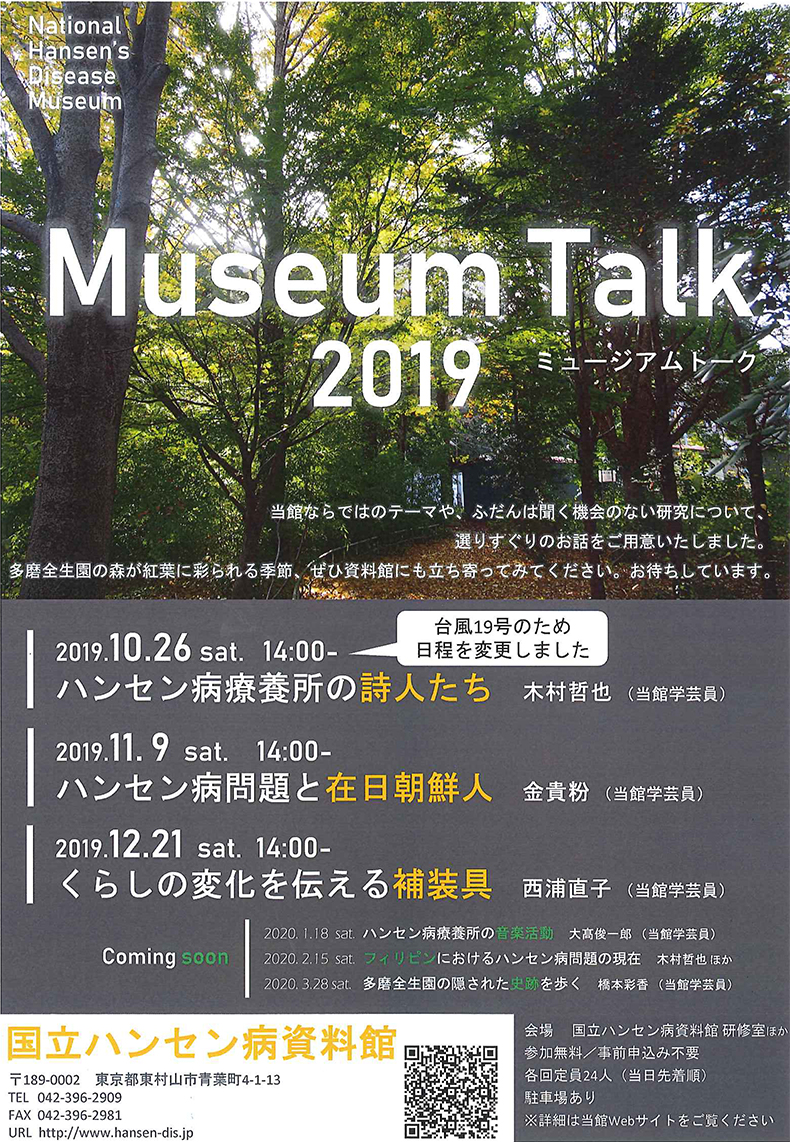Event details
- Top
- event information
- Event List
- <終了しました>【開催報告】ミュージアムトーク 2019年度
2019.12.22
【開催報告】
ミュージアムトーク 2019年度 一覧 *The event has ended.
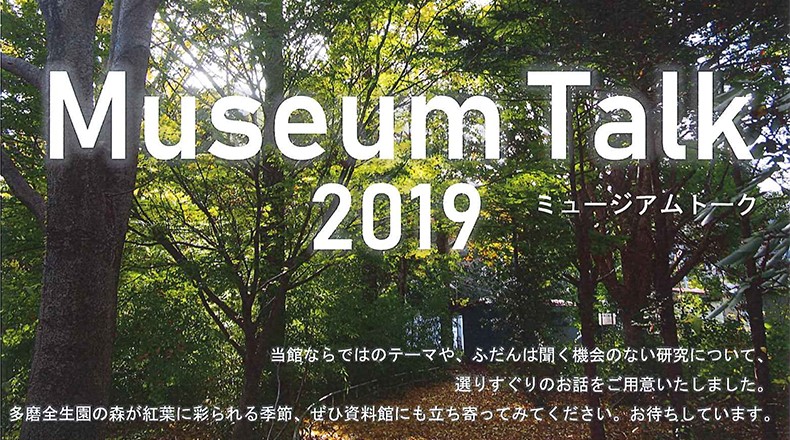
We have prepared various stories about the Issues related to leprosy
Why don't you touch on a theme that you don't usually hear?
Please drop in at the museum during the season when the forest of Tama Zenshoen
Outline of the event
【会場】
国立ハンセン病資料館 1階 研修室
【定員】
各回定員24人(当日先着順)
参加無料/事前申込み不要/駐車場あり
* Schedule, lecturer, presentation, etc. may be changed depending on the circumstances. note that.
「ハンセン病療養所の詩人たち」 当時の記録をYouTubeでご覧いただけます。
講師 木村哲也(当館学芸員)
* Due to Typhoon No. 19, the schedule has been changed from October 12th (Sat) to October 26th (Sat).
In 1953, during the Leprosy Prevention Law of leprosy, "The Bud of Life" (San-ichi Shobo), published with the support of the poet Mitsuo Oe, is a poem that can be said to be a monumental poetry in which 73 poets from sanatoriums nationwide participated. It was an anthology. Focusing on this collection of poems, we will talk about the charm of poetry.
「ハンセン病療養所の詩人たち」開催報告
2019年10月26日(土)14時から15時30分、第1回目ミュージアムトークを開催いたしました。本日はテーマ「ハンセン病療養所の詩人たち」、サブタイトル「詩人・大江満雄との交流を中心に」についてのお話をさせていただきました。
多くのお客様においでいただき、ありがとうございます。お客様からいただきましたご意見やご感想を紹介させていただきます。
From the questionnaire
- Hansen's Disease, but I was interested in this event. The poetry was also wonderful. Mr. Kimura's talk contents, feelings, episodes, etc. were also wonderful. I want to come back again.
- The content was too much and it seems to be indigestion, but it was a very exciting lecture. And "Raisha", "Patients suffering from leprosy see belated learn and in order to solve the" in my own way.
- I learned a lot. I am impressed by the great achievements of the poet Mitsuo Oe. I would like to visit again. I am very interested in Hansen's Disease literature and Hansen's Disease I'll come back later!
- It was an interesting lecture that conveys Oe's Hansen's Disease I learned a lot from the abundant materials. I was able to recognize the importance of Oe today.
- A poet who was treated as a criminal and not only resented as a victim, but also enjoyed the fate given to him and lived in the reality in front of him, and the poet who sympathized with and encouraged them. I am impressed by the existence of a philosopher as to whether it is okay to believe in people. Is there such a person in this era?
- Considering the social situation at that time, I feel that I have a glimpse of some of the possibilities of Mr. Oe, who interacted with each garden and made it known to society, and the young poets who participated in the poetry collection.
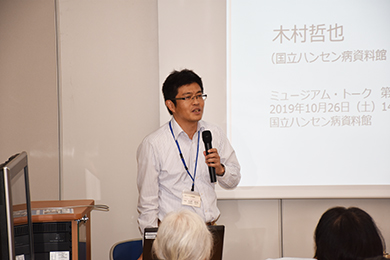 |
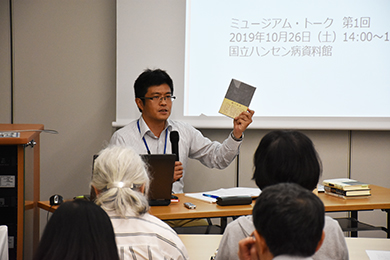 |
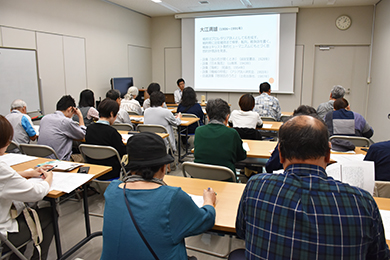 |
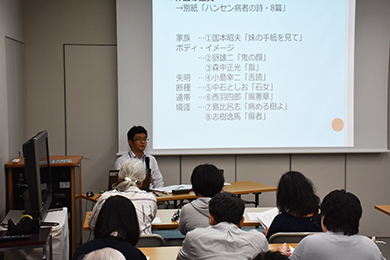 |
「ハンセン病問題と在日朝鮮人」 当日の記録をYouTubeでご覧いただけます。
講師 金貴粉(当館学芸員)
* The venue for today's museum talk has been changed to a video hall.
At most, more than 700 Koreans in Japan were admitted to the Leprosy sanatorium We will follow the trajectory of those who have fought together in the Patient exercises
「ハンセン病問題と在日朝鮮人」開催報告
2019年11月9日(土)14時から15時30分、第2回目ミュージアムトークを開催いたしました。
本日はテーマ「ハンセン病問題と在日朝鮮人」について、そこに生きた様々な方がいたということを皆様と一緒に共有していけるような、お話をさせていただきました。
多くのお客様においでいただき、ありがとうございます。お客様からいただきましたご意見やご感想を紹介させていただきます。
From the questionnaire
- Even if I went to a sanatorium, I only knew about the situation of people living in Japan, "There was double discrimination in the place." I feel the importance of carefully looking at each and every one of us. I would like to ask for the second one.
- I think it was not a problem that stayed in the past, but a story that still applies to the present. Therefore, I am grateful for the very valuable opportunity.
- I had already read the lecturer's book, but today's lecture was also wonderful. I would like to take another opportunity to hear about the literature created by Koreans in Japan.
- I think it's hard to know about not only economic disparities but also subtle differences in consciousness caused by differences in lifestyle and customs between Korean residents in Japan and Japanese residents, so I'm going to visit today. I think it was very meaningful.
- Issues related to leprosy and the Korean in Japan problem have also been expanded in the national policy, and the way of thinking and behavior of many people in society have an influence, so can each person keep thinking? I felt that it was a must-have theme.
- I would like to thank you for your thought-provoking story about contemporary Japan. I would like to thank Dr. Kim and all the people concerned for having the opportunity to hear such a story at a national facility.
- You can also have a resume along with the story, which will be very helpful when you look back. I would like to read the books that were introduced and deepen my understanding as much as possible.
- I was surprised that there were 10 times as many people living in Japan as in the general public at sanatoriums nationwide. I would like to study more about the history of people living in Japan who were doubly discriminated against because they were not Japanese.
- I had a very rich time with the solid knowledge of the gold curator and the gentle tone. As I got to know the ancestors in Japan, my heart ached.
- I regret not knowing that there were Koreans living in Japan who survived double discrimination as Leprosy patients I think it is necessary to consider it as my own problem for coexistence with people living in Japan.
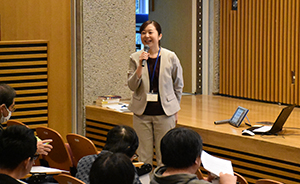 |
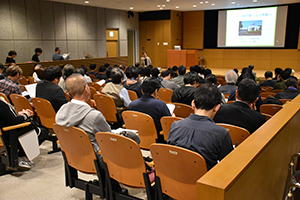 |
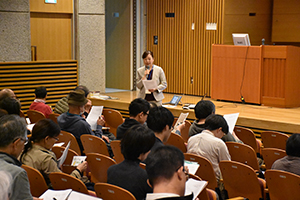 |
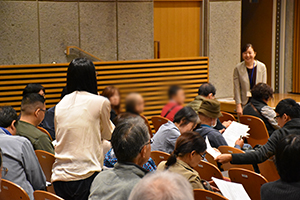 |
「くらしの変化を伝える補装具」 当日の記録をYouTubeでご覧いただけます。
講師 西浦直子(当館学芸員)
At the sanatorium, various prosthetics such as artificial legs and buttons have been made to support the lives of residents. In this episode, we will read the changes in the lifestyle of the sanatorium from the assistive devices related to walking.
「くらしの変化を伝える補装具」開催報告
2019年12月21日(土)14時から15時30分、第3回ミュージアムトークを開催いたしました。
本日はテーマ「くらしの変化を伝える補装具」についてのお話をさせていただきました。
多くのお客様にご参加いただき、ありがとうございます。当日アンケートにていただいたご意見・ご感想を紹介いたします。
From the questionnaire
- I was really impressed with the story that I read through "things".
- I was surprised at the patient's spiciness and the awesomeness of the device.
- The title looks sober, but you can see the image of the person who used it and the person who made it through each tool, and you can see through the management system of the garden in the country beyond that. This content is often taught even today, and I was impressed by the attitude of looking at it and digging up. I think it will be easier to understand if you can see the story and appearance of the person who used it (although you have already thought about it). It's wonderful to be able to talk so much with tools.
- Please hold many museum talks like this one.
- I wanted to hear from you for a longer time. Thank you.
- It was great to hear the story about the role of the prosthesis and the feelings of people who need it.
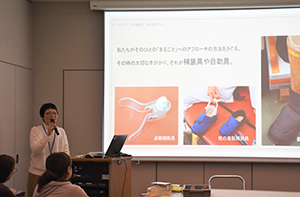 |
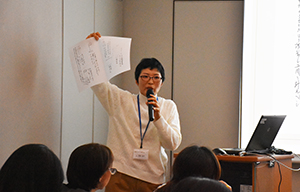 |
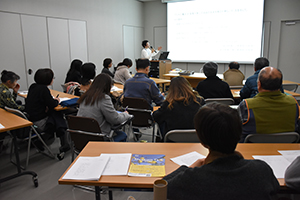 |
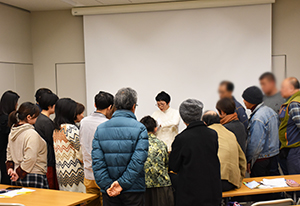 |
ミュージアムトーク 2019のチラシをダウンロードできます。(PDF:1,160KB)

